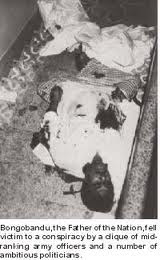Sheikh Mujibur Rahman (1920-1975) was a charismatic leader who organized argument and uprising against the British in India, guided the Bengalis of East Pakistan in their resistance to the unjust actions of the postcolonial Pakistani government, and finally helped create the independent nation of Bangladesh in 1971. He headed the Awami League and was the first President of Bangladesh during the Bangladesh Liberation War, and later became Prime Minister in independent Bangladesh. He is popularly referred to as Sheikh Mujib, with the honorary title of Bangabandhu (বঙ্গবন্ধু Bongobondhu, “Friend of Bengal”). His eldest daughter, Sheikh Hasina, is the present leader of the Awami League and the current (17 march 2015) Prime Minister of Bangladesh.

Bangabandhu Sheik Mujibur Rahman was the planner of our nation and the country by all complexity of the period. Indeed, what we now call Bangladesh was never independent in the most genuine feeling of the term before 1971. It was Mujib and just Mujib who gave the country a genuine touch of opportunity. It was truly a trek into the long method for opportunity from full scale mistreatment through self-sufficiency and home run in which he gave the dynamic lead. He was the courageous warrior of the Language Movement of 1952; the pioneer of the democratic movement of 1962; the designer of the Six-point Development of 1966; the life-power of the Mass Movement of 1969; the fortunate victor of the election of 1970 and, most importantly, the greatest legend of the Liberation War of 1971. He is undisputedly the organizer of independent Bangladesh and, subsequently, the Father of the Country.

On 15 August 1975, a gathering of junior armed force officers attacked the presidential home with tanks and executed Mujib, his family and individual staff. Just his daughter Sheikh Hasina Wajed and Sheik Rehana, who were going by West Germany, survived. They were banned from coming back to Bangladesh. The killing was arranged by disappointed Awami group partners and military officers, which incorporated Mujib’s associate and previous confidante Khondaker Mostaq Ahmad, who turned into his quick successor. There was serious theory in the media blaming the US Central Intelligence Agency for having induced the plot. Lawrence Lifschultz has claimed that the CIA was included in the overthrow and death, building his supposition in light of the then US envoy in Dhaka Eugene Sponsor.
Mujib’s passing drowned the country into numerous years of political turmoil. The coup leaders were soon toppled and a progression of counter-upsets and political deaths deadened the nation. Request was generally restored after an overthrow in 1977 offered control to the armed force Chief Ziaur Rahman. Announcing himself President in 1978, Ziaur Rahman marked the Reimbursement Mandate, giving discharge from prosecution to the men who plotted Mujib’s death and oust.
In a fitting tribute to his respected memory, the present government has announced August 15 as the national mourning day. On this day consistently the individuals would be paying respect to the memory of a man who turned into a legend in his won lifetime. Bangabandhu lives in the heart of his people. Bangladesh and Bangabandhu are one and embedded. Bangladesh was Sheik Mujibur Rahman’s vision, he battled and died for it.
Source: Wikipedia, yourdictionary.com, The Daily Star

Leave a Reply